七年级英语上册教学课件:7A Unit4 Welcome to the unit (共52张PPT)
文档属性
| 名称 | 七年级英语上册教学课件:7A Unit4 Welcome to the unit (共52张PPT) | 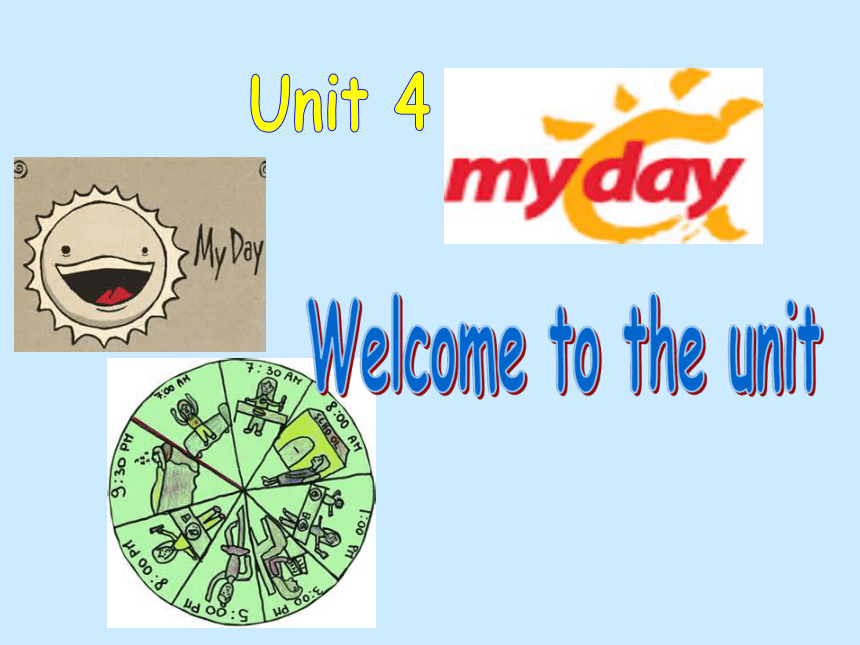 | |
| 格式 | zip | ||
| 文件大小 | 2.6MB | ||
| 资源类型 | 教案 | ||
| 版本资源 | 牛津译林版 | ||
| 科目 | 英语 | ||
| 更新时间 | 2016-10-15 21:00:34 | ||
图片预览

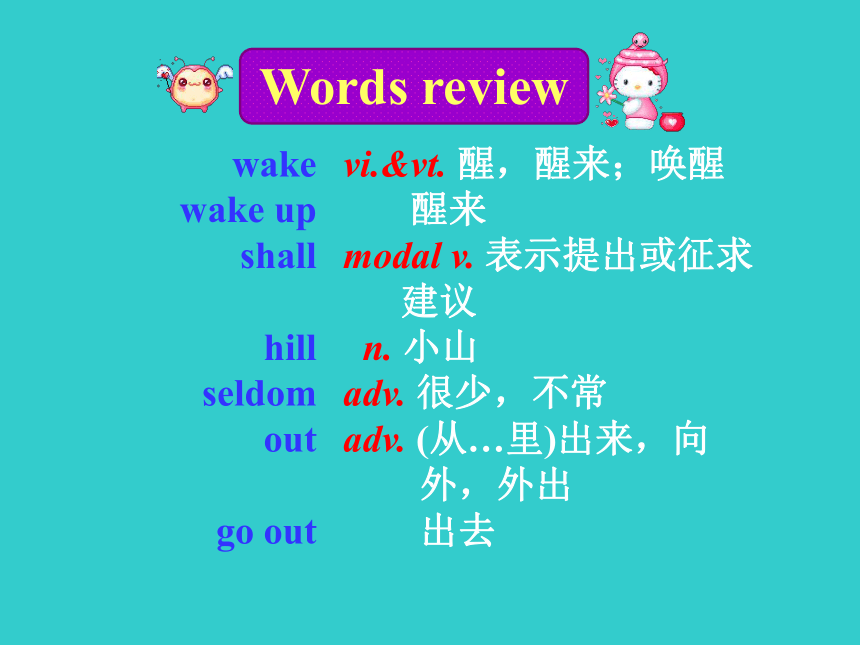
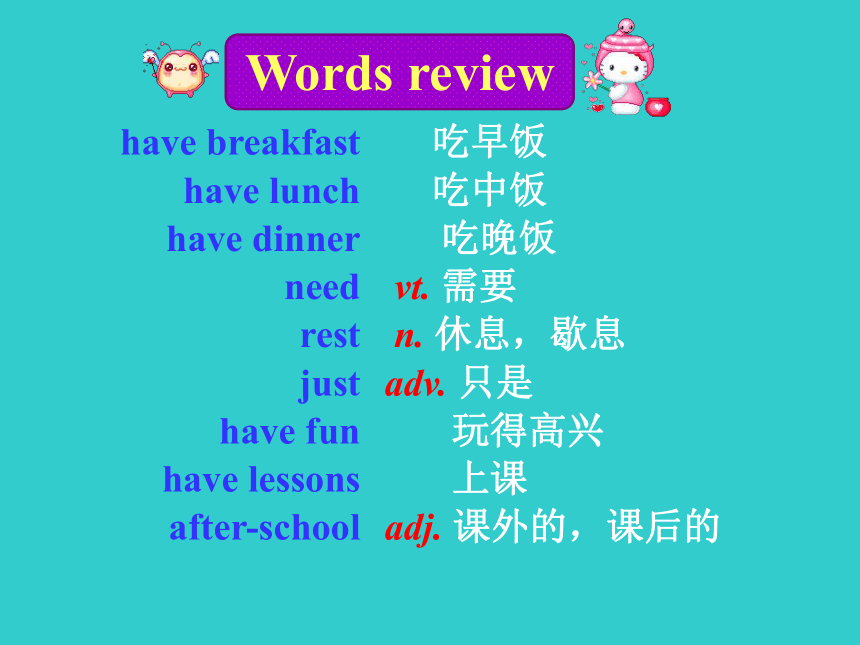
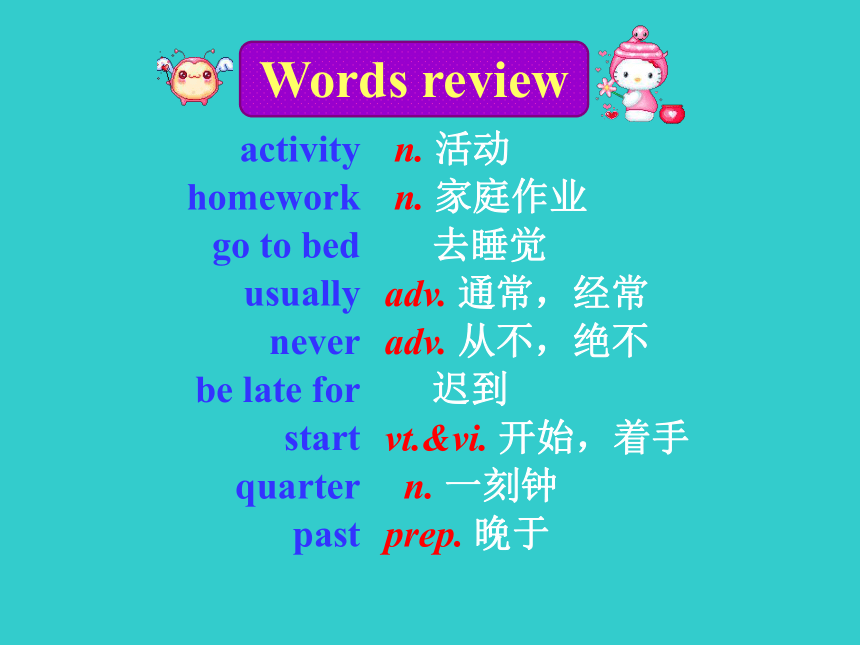
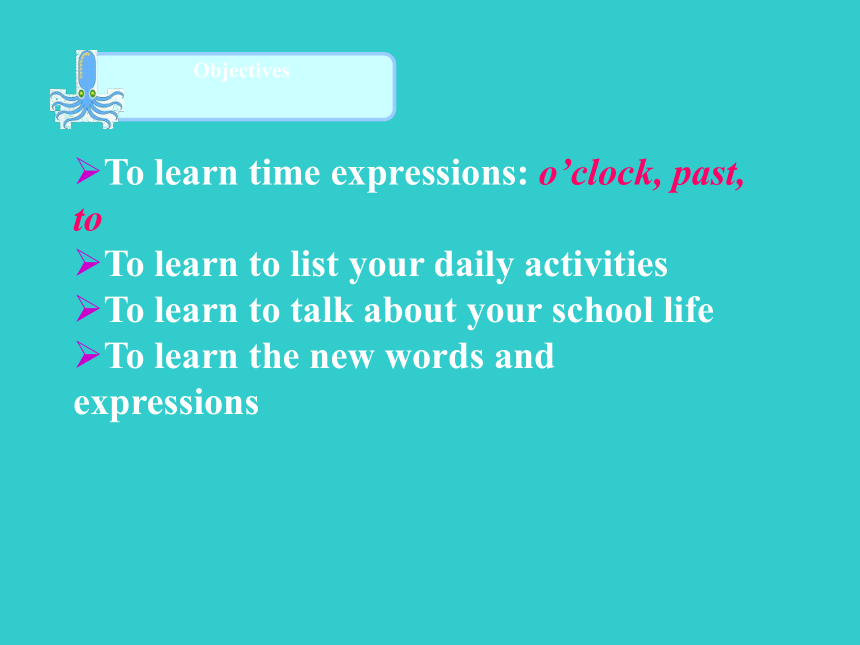
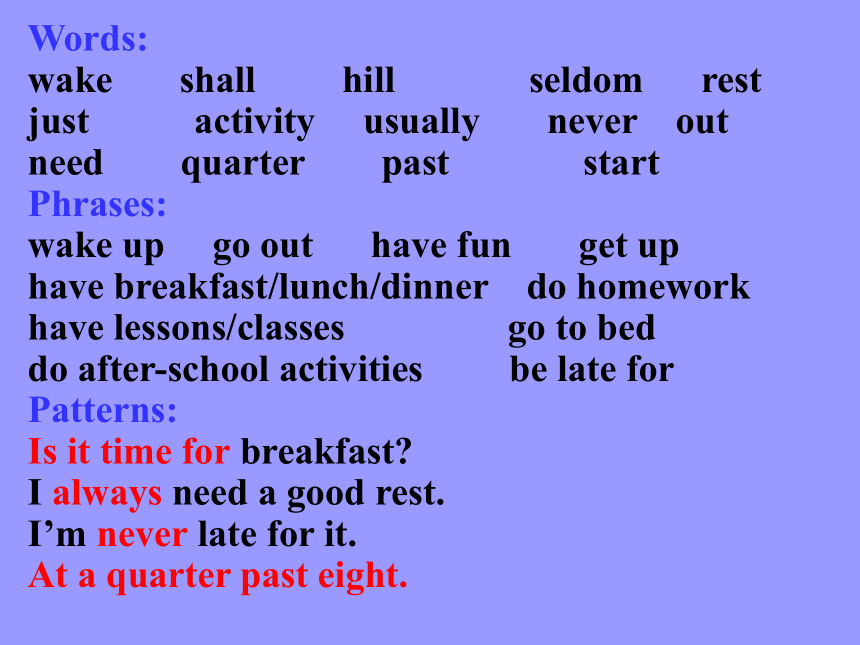
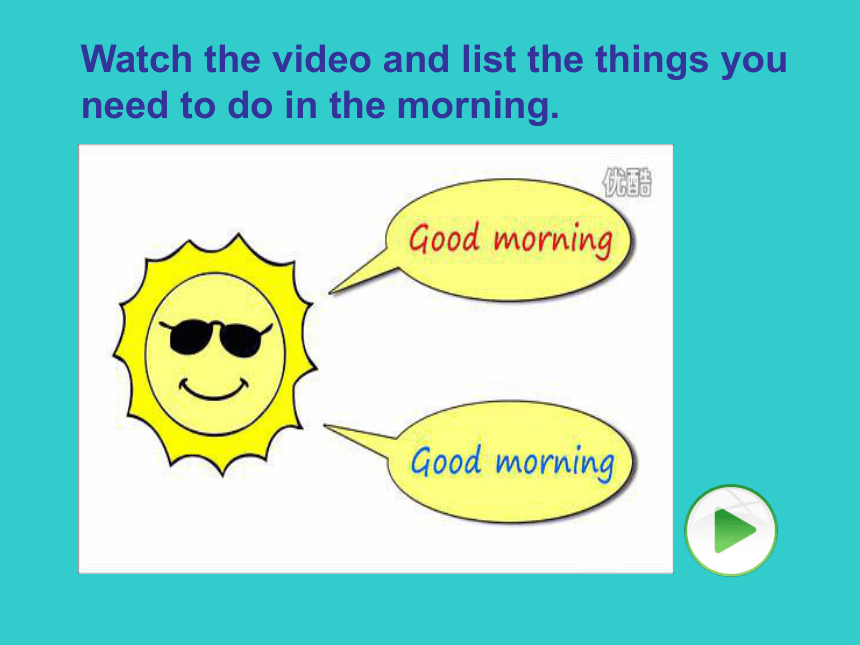


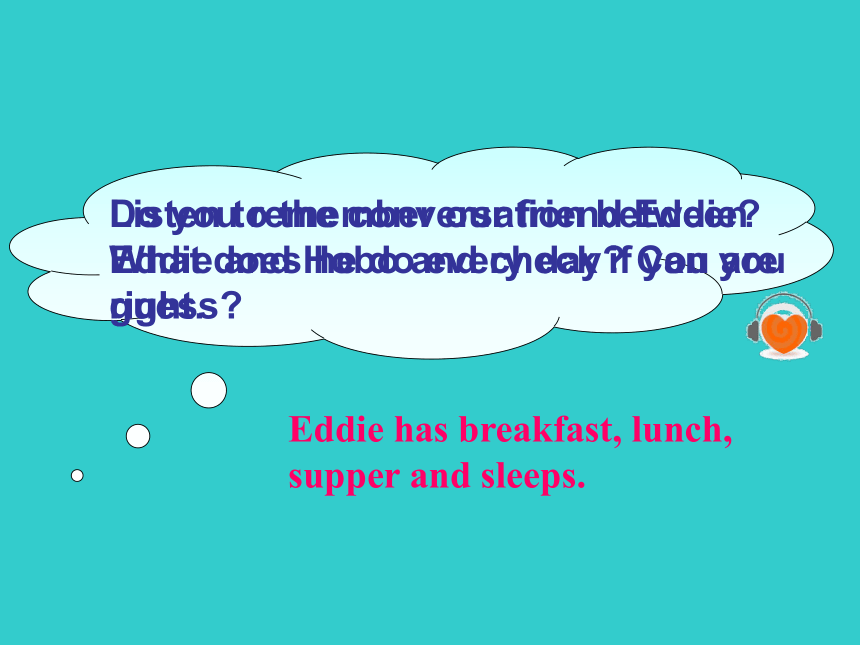
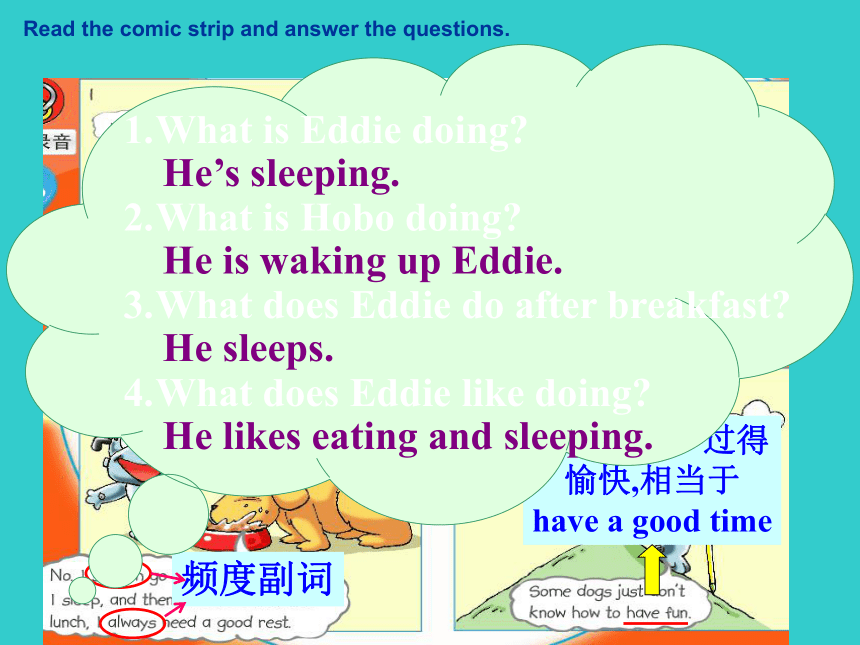
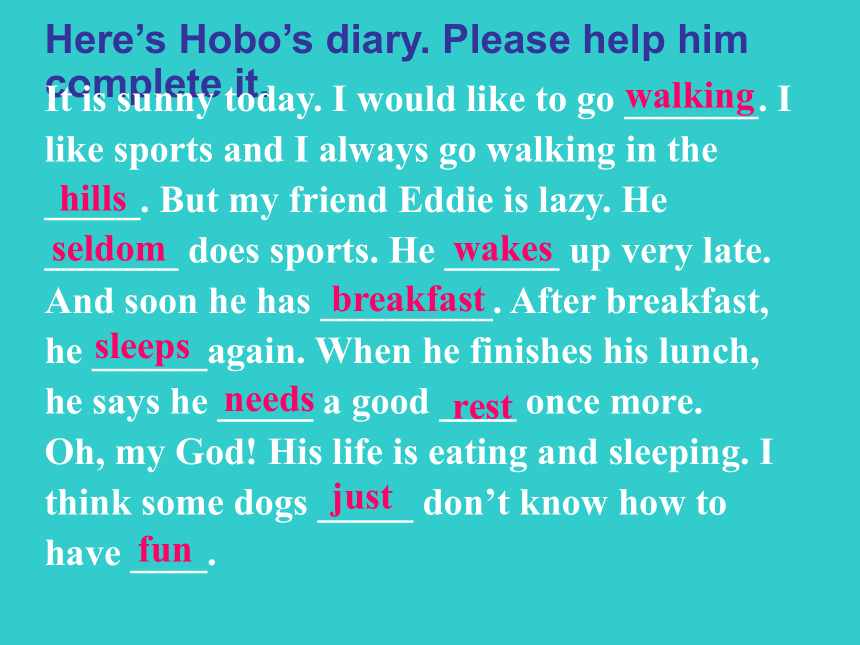
文档简介
课件51张PPT。Unit 4Welcome to the unitwake
wake up
shall
hill
seldom
out
go outvi.&vt. 醒,醒来;唤醒
醒来
modal v. 表示提出或征求
建议
n. 小山
adv. 很少,不常
adv. (从…里)出来,向
外,外出
出去Words reviewhave breakfast
have lunch
have dinner
need
rest
just
have fun
have lessons
after-school 吃早饭
吃中饭
吃晚饭
vt. 需要
n. 休息,歇息
adv. 只是
玩得高兴
上课
adj. 课外的,课后的Words reviewactivity
homework
go to bed
usually
never
be late for
start
quarter
past n. 活动
n. 家庭作业
去睡觉
adv. 通常,经常
adv. 从不,绝不
迟到
vt.&vi. 开始,着手
n. 一刻钟
prep. 晚于Words reviewTo learn time expressions: o’clock, past, to
To learn to list your daily activities
To learn to talk about your school life
To learn the new words and expressionsWords:
wake shall hill seldom rest just activity usually never out need quarter past start
Phrases:
wake up go out have fun get up
have breakfast/lunch/dinner do homework
have lessons/classes go to bed
do after-school activities be late for
Patterns:
Is it time for breakfast?
I always need a good rest.
I’m never late for it.
At a quarter past eight.Watch the video and list the things you need to do in the morning. get upwake upwash my faceput on my shoesbrush my teetheat my breakfastbrush my hairget dressed接龙幻灯片上单词或短语出现时,同学应迅速读出并说出中文意思。每人一词,按行/列依次接龙,3秒内说不出,此行/列同学即失去此答题机会,下一行/列同学接续。Do you remember our friend Eddie? What does he do every day? Can you guess?Listen to the conversation between Eddie and Hobo and check if you are right.Eddie has breakfast, lunch, supper and sleeps.Read the comic strip and answer the questions.频度副词玩得高兴,过得愉快,相当于have a good timeWhat is Eddie doing?
What is Hobo doing?
What does Eddie do after breakfast?
What does Eddie like doing?He’s sleeping.
He is waking up Eddie.
He sleeps.
He likes eating and sleeping.Here’s Hobo’s diary. Please help him complete it.It is sunny today. I would like to go _______. I like sports and I always go walking in the _____. But my friend Eddie is lazy. He _______ does sports. He ______ up very late.
And soon he has _________. After breakfast, he ______again. When he finishes his lunch, he says he _____ a good ____ once more.
Oh, my God! His life is eating and sleeping. I think some dogs _____ don’t know how to have ____.walkinghillsseldomwakesbreakfastsleepsneedsrestjustfunWhat time is it? /What’s the time?……点钟时间整点的表达法:
整点钟 + o’clock
例如: ten o’clock 5:006:00six o’clock7:00seven o’clockfive o’clock—What time is it? / What’s the time?
—It’s …What time is it? /What’s the time?a quarter = 15 minutes时间未过30分的表达法:
顺读:点钟 + 分钟
逆读:分钟 + past + 点钟
如:9:20 读成 nine twenty /
twenty past nine超过(几点)one twentytwenty past onethree seventeenseventeen past threesix twenty-fivetwenty-five past six 1:203:176:25—What time is it? / What’s the time?
—It’s …half = 30 minutesWhat time is it? /What’s the time?时间刚好是30分钟:
顺读:点钟 + thirty
逆读:half past +点钟
如:9:30 读成 nine thirty /
half past ninenine thirtyhalf past ninehalf past fourhalf past eightfour thirtyeight thirty9:304:308:30—What time is it? / What’s the time?
—It’s … (距下个整点时间) 差……What time is it? /What’s the time?时间已过30分钟:
顺读:点钟 + 分钟
逆读: (60?分钟) + to + (点钟 +1),
即用差几分到下一点钟表达。如:
8:50 = (60?50) + to + (8+1) = ten to ninesix fortytwenty to seven6:40six forty-fivefifteen to seven6:45a quarter to seven10:40ten fortytwenty to eleven—What time is it? / What’s the time?
—It’s …6:008:0510:1512:303:409:45six / six o’clockeight five / five past eightten fifteen / fifteen past ten /
a quarter past tentwelve thirty / half past twelvethree forty / twenty to fournine forty-five / fifteen to ten /
a quarter to tenPracticeThis is a table of Millie’s day. Make a short dialogue with your partner according to the table.A day at schoolWhen/What time does Millie get up every day?She gets up at…1. — I would like to go to school with
Millie. What time can I meet her at
her gate?
— 7:20.
2. —What does Millie do at 8:00 a.m.?
— She does morning exercises.
3. —How many hours does Millie have
lessons every day?
— 6 hours. Some possible dialogues:4. — Does she go home at 4:00 p.m.?
What does she do?
— No, she doesn’t. She does after-school activities at 4:00 p.m.
5. —What does Millie do after dinner?
— She watches TV after dinner.
6. —What time does Millie go to bed?
— She goes to bed at 9:30 p.m.Millie ________ at 6:30 a.m. She has breakfast _____ 7:00 a.m. Then she _____ to school. At 8:00 a.m., she _____ morning exercises. After that, she _____ _______ at 8:15 a.m.
She ____________ at 11:50 a.m. _____1:30 p.m. she has lessons again. At 4:00 p.m. she _____ after-school activities. She _________ at 4:30 p.m.
She _________ at 6:30 p.m. At 7:00 p.m. she _______ TV. She ____ her homework at 7:30 p.m.
At 9:30 p.m. she __________.gets upatgoeshasdoesComplete the passage according to the table.does has breakfast goes homedoes has dinnerwatches goes to bedAt lessonsAre your daily activities the same as Millie’s? Complete the table with your own information.Make a conversation with your partner and get more information about his/her daily activities.P43AMillie is telling her aunt about her school life. Listen to their conversation and answer the question: Is Millie often late for school?P43BNo, she is never late for school.Aunt: Millie, when do you go to school
every day?
Millie: I ______ go to school at 7:20.
I’m ______ late _____ it.
Aunt: Good. What time do you start
lessons?
Millie: ____ a quarter _____ eight.
Aunt: Do you ___________, Millie?
Millie: Yes. I enjoy it very much.usuallyneverAt forenjoy schoolpastRead the conversation and fill in the blanks.频度副词一般放在行为动词的前面,助动词do/does和动词be 的后面。常用频度副词及频率大小为:
always > usually > often > sometimes > seldom >never
总是 通常 经常 有时 很少 从不Work in pairs and talk about your school life. Use the conversation below as a model. Role-play1. Role play the conversation in groups;
2. Role play the conversation in front of the classLet’s see which group does the best.Language points1. Wake up, Eddie! wake up除了有“醒来”之意外,还可表示“唤醒,使……醒来”。
当被叫醒的对象是人称代词时,要用宾格形式,且必须放在短语中间;当被叫醒的对象是名词时,可放在短语中间,也可放在短语后面。汤姆,谢谢你每天早晨叫我的表弟起床。
你明早七点能把他叫醒吗?
Tom, thanks for waking my cousin up
every morning.
= Tom, thanks for waking up my cousin every morning.
Can you wake him up at 7:00 tomorrow morning?It’s time for sth意为“是……的时候了”,
可以和It’s time to do sth进行互换。2. Is it time for breakfast? 上课时间到了,我们进教室吧。
午餐时间到了。
It’s time for class. Let’s go to the classroom.
It’s time to have lunch.
= It’s time for lunch. 我们该吃晚饭了。
他们该上课了。
你该擦黑板了。
拓展:It’s time for sb to do sth意为“对
某人来说该做某事了”。
It’s time for us to have dinner.
It’s time for them to have class.
It’s time for you to clean the blackboard. 3. After breakfast…and then I have lunch.表示三餐 (breakfast / lunch / dinner / supper) 的名词前一般不用冠词。当表示三餐的名词被定语修饰时,前面通常带不定冠词。我每天和我的父母一起吃早餐。
我今天吃了一顿丰盛的晚餐。
I have breakfast with my parents every day.
I eat/have a nice dinner today. 4. Some dogs just don’t know how to have fun. 这里how to have fun是“疑问词+动词不定式”结构,在句中作know的宾语。
have fun意为“玩得高兴”,与have fun意思相近的短语有have a good time。你在聚会上玩得开心吗?
Did you have fun/have a good time at the party? 5. I’m never late for it.be late for 意为“迟到,迟做……”,for为介词,其后须跟名词作宾语。开会别迟到了!
快点!你上课可能要迟到了。
Don’t be late for the meeting!
Hurry up! You may be late for class. 6. Do you enjoy school, Millie?这里school是不可数名词,前面不加a或the,表示“上课(或上学)时间”。放学
上学
我很喜欢上学。
after school
at / in school
I enjoy school very much.Reflection wake up / wake up sb. / wake sb. up
It’s time for …
It’s time (for sb.) to do sth.
3. know how to have fun
4. have lunch / supper / breakfast
5. be late for…
6. enjoy schoolNow 2 mins to test your spelling.Spelling Bee1. English-Chinese
shall hill out rest seldom
after-school activity homework quarter past usually start
2. Chinese-English
醒来 吃早饭/中饭/晚饭 需要 迟到
玩得高兴 出去 上课 去睡觉When finishing, exchange your papers to see who does the best.请点击1. Hi, Shin-chan! W_____ up!
It’s nine o’clock now.
2. It’s sunny today. Let’s go to walk in the
h____.
3. It’s 11:30 a.m. It’s time for l_____.
4. My sister s______ plays basketball. She doesn’t like it.
5. Mother’s Day is coming. What s______ I buy for my mother? I. 根据所给提示填空。akeillseldomhallunch1. Please have ____ breakfast in ____ morning. It’s good for you.
A. the; a B. a; the
C. /; / D. /; the
2. My father usually walks the dog ___
dinner.
A. behind B. in C. after D. for
3. — ____ do you usually go to the zoo?
— On Saturday morning.
A. What B. When C. How D. Where Ⅱ. 单项选择 4. Jack, it’s 8:20. You are ____ for class again.
A. glad B. free C. late D. good
5. — Does your father often ____ TV
after supper?
— Sometimes. He usually ____books.
A. watches; reads
B. look; looks at
C. read; watches
D. watch; readsA. Have fun!
B. Thanks.
C. I don’t feel well now.
D. He likes playing volleyball, too.
E. I think I need a good rest.Ⅲ. 从方框中选择合适的句子填空。Anna: Hi, Paul! Shall we go to play
volleyball?
Paul: I’m sorry. (1) _____
Anna: What’s wrong with you?C Paul: I’m just too tired. (2) ___
Anna: Then go and have a good sleep.
Paul: (3) ____ What about you?
Anna: I can play with Sam. (4) ____
Paul: OK. (5) _____
Anna: Thank you. See you! A. Have fun!
B. Thanks.
C. I don’t feel well now.
D. He likes playing volleyball, too.
E. I think I need a good rest.E B D A Ⅳ. Andy在介绍自己的父亲,请根据要求完成句子。
1. My father goes back home at 6:00 p.m. every day. (对划线部分提问)
________ ________ ________ your father go back home every day?
2. It’s time for bed. (改为同义句)
It’s time ________ ________ ________ ________. What time does to go tobed3. 我爸爸上班从来不迟到。(完成句子)
My father ________ ________ ________ ________ work.
4. 我的爸爸就是不知道怎样玩得开心。(完成句子)
My father ________ doesn’t know ________ ________ ________ ________.
5. 他经常出去做运动。(完成句子)
He ________ ________ for sports often. is never late for just how to have fun goes outHomework1. Ask your parents some questions to know more about their daily activities.
2. Preview the new words and expressions in Reading.
wake up
shall
hill
seldom
out
go outvi.&vt. 醒,醒来;唤醒
醒来
modal v. 表示提出或征求
建议
n. 小山
adv. 很少,不常
adv. (从…里)出来,向
外,外出
出去Words reviewhave breakfast
have lunch
have dinner
need
rest
just
have fun
have lessons
after-school 吃早饭
吃中饭
吃晚饭
vt. 需要
n. 休息,歇息
adv. 只是
玩得高兴
上课
adj. 课外的,课后的Words reviewactivity
homework
go to bed
usually
never
be late for
start
quarter
past n. 活动
n. 家庭作业
去睡觉
adv. 通常,经常
adv. 从不,绝不
迟到
vt.&vi. 开始,着手
n. 一刻钟
prep. 晚于Words reviewTo learn time expressions: o’clock, past, to
To learn to list your daily activities
To learn to talk about your school life
To learn the new words and expressionsWords:
wake shall hill seldom rest just activity usually never out need quarter past start
Phrases:
wake up go out have fun get up
have breakfast/lunch/dinner do homework
have lessons/classes go to bed
do after-school activities be late for
Patterns:
Is it time for breakfast?
I always need a good rest.
I’m never late for it.
At a quarter past eight.Watch the video and list the things you need to do in the morning. get upwake upwash my faceput on my shoesbrush my teetheat my breakfastbrush my hairget dressed接龙幻灯片上单词或短语出现时,同学应迅速读出并说出中文意思。每人一词,按行/列依次接龙,3秒内说不出,此行/列同学即失去此答题机会,下一行/列同学接续。Do you remember our friend Eddie? What does he do every day? Can you guess?Listen to the conversation between Eddie and Hobo and check if you are right.Eddie has breakfast, lunch, supper and sleeps.Read the comic strip and answer the questions.频度副词玩得高兴,过得愉快,相当于have a good timeWhat is Eddie doing?
What is Hobo doing?
What does Eddie do after breakfast?
What does Eddie like doing?He’s sleeping.
He is waking up Eddie.
He sleeps.
He likes eating and sleeping.Here’s Hobo’s diary. Please help him complete it.It is sunny today. I would like to go _______. I like sports and I always go walking in the _____. But my friend Eddie is lazy. He _______ does sports. He ______ up very late.
And soon he has _________. After breakfast, he ______again. When he finishes his lunch, he says he _____ a good ____ once more.
Oh, my God! His life is eating and sleeping. I think some dogs _____ don’t know how to have ____.walkinghillsseldomwakesbreakfastsleepsneedsrestjustfunWhat time is it? /What’s the time?……点钟时间整点的表达法:
整点钟 + o’clock
例如: ten o’clock 5:006:00six o’clock7:00seven o’clockfive o’clock—What time is it? / What’s the time?
—It’s …What time is it? /What’s the time?a quarter = 15 minutes时间未过30分的表达法:
顺读:点钟 + 分钟
逆读:分钟 + past + 点钟
如:9:20 读成 nine twenty /
twenty past nine超过(几点)one twentytwenty past onethree seventeenseventeen past threesix twenty-fivetwenty-five past six 1:203:176:25—What time is it? / What’s the time?
—It’s …half = 30 minutesWhat time is it? /What’s the time?时间刚好是30分钟:
顺读:点钟 + thirty
逆读:half past +点钟
如:9:30 读成 nine thirty /
half past ninenine thirtyhalf past ninehalf past fourhalf past eightfour thirtyeight thirty9:304:308:30—What time is it? / What’s the time?
—It’s … (距下个整点时间) 差……What time is it? /What’s the time?时间已过30分钟:
顺读:点钟 + 分钟
逆读: (60?分钟) + to + (点钟 +1),
即用差几分到下一点钟表达。如:
8:50 = (60?50) + to + (8+1) = ten to ninesix fortytwenty to seven6:40six forty-fivefifteen to seven6:45a quarter to seven10:40ten fortytwenty to eleven—What time is it? / What’s the time?
—It’s …6:008:0510:1512:303:409:45six / six o’clockeight five / five past eightten fifteen / fifteen past ten /
a quarter past tentwelve thirty / half past twelvethree forty / twenty to fournine forty-five / fifteen to ten /
a quarter to tenPracticeThis is a table of Millie’s day. Make a short dialogue with your partner according to the table.A day at schoolWhen/What time does Millie get up every day?She gets up at…1. — I would like to go to school with
Millie. What time can I meet her at
her gate?
— 7:20.
2. —What does Millie do at 8:00 a.m.?
— She does morning exercises.
3. —How many hours does Millie have
lessons every day?
— 6 hours. Some possible dialogues:4. — Does she go home at 4:00 p.m.?
What does she do?
— No, she doesn’t. She does after-school activities at 4:00 p.m.
5. —What does Millie do after dinner?
— She watches TV after dinner.
6. —What time does Millie go to bed?
— She goes to bed at 9:30 p.m.Millie ________ at 6:30 a.m. She has breakfast _____ 7:00 a.m. Then she _____ to school. At 8:00 a.m., she _____ morning exercises. After that, she _____ _______ at 8:15 a.m.
She ____________ at 11:50 a.m. _____1:30 p.m. she has lessons again. At 4:00 p.m. she _____ after-school activities. She _________ at 4:30 p.m.
She _________ at 6:30 p.m. At 7:00 p.m. she _______ TV. She ____ her homework at 7:30 p.m.
At 9:30 p.m. she __________.gets upatgoeshasdoesComplete the passage according to the table.does has breakfast goes homedoes has dinnerwatches goes to bedAt lessonsAre your daily activities the same as Millie’s? Complete the table with your own information.Make a conversation with your partner and get more information about his/her daily activities.P43AMillie is telling her aunt about her school life. Listen to their conversation and answer the question: Is Millie often late for school?P43BNo, she is never late for school.Aunt: Millie, when do you go to school
every day?
Millie: I ______ go to school at 7:20.
I’m ______ late _____ it.
Aunt: Good. What time do you start
lessons?
Millie: ____ a quarter _____ eight.
Aunt: Do you ___________, Millie?
Millie: Yes. I enjoy it very much.usuallyneverAt forenjoy schoolpastRead the conversation and fill in the blanks.频度副词一般放在行为动词的前面,助动词do/does和动词be 的后面。常用频度副词及频率大小为:
always > usually > often > sometimes > seldom >never
总是 通常 经常 有时 很少 从不Work in pairs and talk about your school life. Use the conversation below as a model. Role-play1. Role play the conversation in groups;
2. Role play the conversation in front of the classLet’s see which group does the best.Language points1. Wake up, Eddie! wake up除了有“醒来”之意外,还可表示“唤醒,使……醒来”。
当被叫醒的对象是人称代词时,要用宾格形式,且必须放在短语中间;当被叫醒的对象是名词时,可放在短语中间,也可放在短语后面。汤姆,谢谢你每天早晨叫我的表弟起床。
你明早七点能把他叫醒吗?
Tom, thanks for waking my cousin up
every morning.
= Tom, thanks for waking up my cousin every morning.
Can you wake him up at 7:00 tomorrow morning?It’s time for sth意为“是……的时候了”,
可以和It’s time to do sth进行互换。2. Is it time for breakfast? 上课时间到了,我们进教室吧。
午餐时间到了。
It’s time for class. Let’s go to the classroom.
It’s time to have lunch.
= It’s time for lunch. 我们该吃晚饭了。
他们该上课了。
你该擦黑板了。
拓展:It’s time for sb to do sth意为“对
某人来说该做某事了”。
It’s time for us to have dinner.
It’s time for them to have class.
It’s time for you to clean the blackboard. 3. After breakfast…and then I have lunch.表示三餐 (breakfast / lunch / dinner / supper) 的名词前一般不用冠词。当表示三餐的名词被定语修饰时,前面通常带不定冠词。我每天和我的父母一起吃早餐。
我今天吃了一顿丰盛的晚餐。
I have breakfast with my parents every day.
I eat/have a nice dinner today. 4. Some dogs just don’t know how to have fun. 这里how to have fun是“疑问词+动词不定式”结构,在句中作know的宾语。
have fun意为“玩得高兴”,与have fun意思相近的短语有have a good time。你在聚会上玩得开心吗?
Did you have fun/have a good time at the party? 5. I’m never late for it.be late for 意为“迟到,迟做……”,for为介词,其后须跟名词作宾语。开会别迟到了!
快点!你上课可能要迟到了。
Don’t be late for the meeting!
Hurry up! You may be late for class. 6. Do you enjoy school, Millie?这里school是不可数名词,前面不加a或the,表示“上课(或上学)时间”。放学
上学
我很喜欢上学。
after school
at / in school
I enjoy school very much.Reflection wake up / wake up sb. / wake sb. up
It’s time for …
It’s time (for sb.) to do sth.
3. know how to have fun
4. have lunch / supper / breakfast
5. be late for…
6. enjoy schoolNow 2 mins to test your spelling.Spelling Bee1. English-Chinese
shall hill out rest seldom
after-school activity homework quarter past usually start
2. Chinese-English
醒来 吃早饭/中饭/晚饭 需要 迟到
玩得高兴 出去 上课 去睡觉When finishing, exchange your papers to see who does the best.请点击1. Hi, Shin-chan! W_____ up!
It’s nine o’clock now.
2. It’s sunny today. Let’s go to walk in the
h____.
3. It’s 11:30 a.m. It’s time for l_____.
4. My sister s______ plays basketball. She doesn’t like it.
5. Mother’s Day is coming. What s______ I buy for my mother? I. 根据所给提示填空。akeillseldomhallunch1. Please have ____ breakfast in ____ morning. It’s good for you.
A. the; a B. a; the
C. /; / D. /; the
2. My father usually walks the dog ___
dinner.
A. behind B. in C. after D. for
3. — ____ do you usually go to the zoo?
— On Saturday morning.
A. What B. When C. How D. Where Ⅱ. 单项选择 4. Jack, it’s 8:20. You are ____ for class again.
A. glad B. free C. late D. good
5. — Does your father often ____ TV
after supper?
— Sometimes. He usually ____books.
A. watches; reads
B. look; looks at
C. read; watches
D. watch; readsA. Have fun!
B. Thanks.
C. I don’t feel well now.
D. He likes playing volleyball, too.
E. I think I need a good rest.Ⅲ. 从方框中选择合适的句子填空。Anna: Hi, Paul! Shall we go to play
volleyball?
Paul: I’m sorry. (1) _____
Anna: What’s wrong with you?C Paul: I’m just too tired. (2) ___
Anna: Then go and have a good sleep.
Paul: (3) ____ What about you?
Anna: I can play with Sam. (4) ____
Paul: OK. (5) _____
Anna: Thank you. See you! A. Have fun!
B. Thanks.
C. I don’t feel well now.
D. He likes playing volleyball, too.
E. I think I need a good rest.E B D A Ⅳ. Andy在介绍自己的父亲,请根据要求完成句子。
1. My father goes back home at 6:00 p.m. every day. (对划线部分提问)
________ ________ ________ your father go back home every day?
2. It’s time for bed. (改为同义句)
It’s time ________ ________ ________ ________. What time does to go tobed3. 我爸爸上班从来不迟到。(完成句子)
My father ________ ________ ________ ________ work.
4. 我的爸爸就是不知道怎样玩得开心。(完成句子)
My father ________ doesn’t know ________ ________ ________ ________.
5. 他经常出去做运动。(完成句子)
He ________ ________ for sports often. is never late for just how to have fun goes outHomework1. Ask your parents some questions to know more about their daily activities.
2. Preview the new words and expressions in Reading.
同课章节目录
- 预备课程
- Lesson 1 Nice to meet you !
- Lesson 2 A happy family
- Lesson 3 A nice school
- Lesson 4 You look cool !
- Lesson 5 Wonderful things
- Lesson 6 Have nice food
- Lesson 7 Enjoy our days
- Lesson 8 Let's have fun !
- Unit 1 This is me
- Unit 2 Let's play sports
- Unit 3 Welcome to our school
- Unit 4 My day
- Unit 5 Let’s celebrate
- Unit 6 Food and lifestyle
- Unit 7 Shopping
- Unit 8 Fashion
